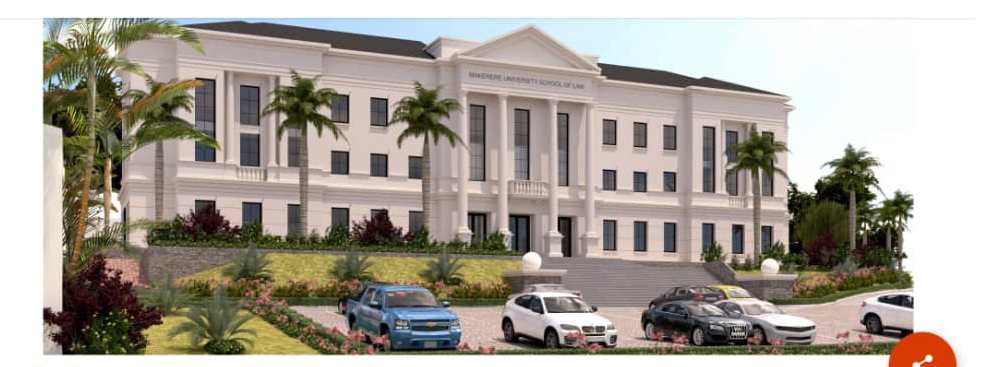The School of Law: Its History, 1968 - 2022

Makerere University is celebrating 100years since it opened its doors as a humble technical school in 1922. The University has grown to become one of the oldest and prestigious universities in Africa. The theme of the centennial celebrations is ‘Leveraging 100 Years of Excellence in Building a Transformed Society’.
As a constituent of Makerere University, the School of Law looks back on its history as well during this centennial year. The School of Law (SoL), Makerere University is the oldest institution offering degree awarding legal education in Uganda. SoL has evolved from 1968 when it was established as a Department of Law in the Faculty of Social Sciences, becoming the Faculty of Law in 1973 and School of Law in 2011. The School offers three degree programmes i.e., Bachelor of Laws (LL. B), Master of Laws (LL. M) and Doctor of Laws (LL. D).
While the fast graduating class (1968-71) was made up of 17 male students and 6 females, at the 71st Graduation Ceremony of Makerere University held May 2021, a total of 276 Bachelor of Laws graduands were presented including 92 (female) and 184 (male). Whereas the Faculty opened with only 6 teachers, today it is made up of a teaching staff of over thirty, comprising 23 males and 14 females. All of the staff are Ugandan academics who have distinguished themselves m their respective disciplines. Commencing as a department in the faculty of Social Sciences, today the Faculty is divided into five departments, viz., Law & Jurisprudence, Commercial Law, Public and Comparative Law, the Human Rights & Peace Centre (HURIPEC) and the Centre for Environment Law. The School has five big initiatives that largely focus on research, advocacy and outreach. These are the Refugee Law Project (RLP), Public Interest Law Clinic (PILAC), Centre for Law and Emerging Technologies (CLET) and the Business Law Clinic (BLC).The growth of the School of Law is characterized by several milestones as highlighted below.
1968 Establishment of the Department of Law at Makerere University, which was an opportunity for grooming indigenous lawyers.
-
The Department of Law upgraded to a fully-fledged Faculty. This marked the consolidation of the institution.
-
Formation of Makerere Law Society, a student’s representative body.
-
Publication of the Makerere Law Journal, a students’ journal, which is an outlet for student publications.
-
The first time for the Faculty to register a First Class LL. B Degree, and this was a positive reflection on teaching quality.
-
The Faculty of Law moved to its own premises, which enhanced its profile and presence.
-
There was an administrative edict requiring full time teaching which resulted into serious brain-drain of the Faculty.
1978 LL.M program introduced. This created more postgraduate study opportunities for the Faculty.
1981 Legal Practice was permitted for Law Lecturers. This resulted into more flexibility and led to reduced brain drain.
1990 Introduction of cost sharing. The book bank was establishment leading to increased access to reading materials.
-
The evening programmes were introduced leading to an increase in student numbers and more financial resources.
-
Formation of linkages with the University of Florida. This was an opportunity for student / staff exchange.
-
The Human Rights and Peace Centre was established, which saw the introduction of human rights outreach programs in addition to teaching programmes.
The East- African Journal of Peace and Human Rights (EAJPHR) was launched.
For the first time, the Faculty won the All Africa Human Rights Moot Court Competition. This led to an improvement on the public image of the Faculty, both internationally and at home.
-
The Odoki Report on Legal Education was published. It resulted into new/ liberalized admission requirements and a broader curriculum.
The four-year Bachelor of Laws program was introduced.
1997 The semester system was introduced. There was an expansion of course offerings for
students.
Curriculum review and development led to more flexibility. Greater demands on the
Faculty.
New Lecture auditorium opened.
The Faculty of Law won the All-Africa Human Rights Moot Competition for the second time.
1999 The first Faculty Strategic plan was published. This was an opportunity for better planning and strategic thinking.
The LL. D Program was introduced. It offered faculty members an opportunity to study from home.
The Faculty got into collaboration with the Centre for Human Rights,
University of Pretoria.
-
The Refugee Law Project (RLP) was established as an outreach programme of the Faculty.
Post-Graduate Diploma in Forced Migration was introduced.
The Faculty got into collaboration with the University of Warwick.
The Faculty won the All-Africa Human Rights Moot Court Competition for the third time.
-
The Sexual Harassment Policy was adopted. The Faculty once again became a trailblazer for Makerere University and other Institutions in Uganda, e.g. The Law Development Centre.
-
The first female Dean, Dr. Sylvia Tamale was elected. She became a role model for young female students and a sign of increased gender sensitivity at the Faculty.
-
The First LL. D degree was awarded to Professor Ben K. Twinomugisha.
-
The Gender, Law & Sexuality Research Project was launched.
-
The Faculty of Law transformed into the School of Law.
Centre for Environmental Law is established
-
The Public Interest Law Clinic was launched, becoming the first of its kind at a University in Uganda.
-
School of Law wins the third regional Child Rights moots competition.
2016 Network of Public Interest Lawyers (NETPI) is established.
PILAC is accredited by Uganda Law Council as a legal aid service provider
2018 School celebrates 50 years of existence under the tag SOL@50.
2020 Disability Law and Rights Centre is launched.
2021 Commissioning the new School of Law Building
